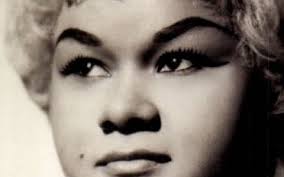If you look up R&B in the dictionary there should be a picture of today’s record because the record pretty much defines R&B. It is a slab of southern soul sung by a great singer, played by storied musicians, and recorded in a legendary studio. It all adds up to an immortal record.
By the time she recorded “I’d Rather Go Blind” in 1967 Etta James had been singing for nearly 25 years. In 1938 she’d been born Jamesetta Hawkins in LA to a 14 year-old mother and an unknown father. She was raised in foster homes and began getting vocal lessons from the director of her church choir when she was five years-old. One of Jamesetta’s foster parents liked to get drunk and demand that she sing for his friends. His methods of persuasion included beatings. The trauma never left her, and throughout her life she was reticent to sing on demand.
When she was 12, Jamesetta’s biological mother took her child to live in San Francisco. There the young singer formed a girl group called the Creolettes. Accounts vary on how Jamesetta met band leader Johnny Otis. In any event he became a mentor to the Creolettes, changed their name to the Peaches, got them signed to Modern Records, and reversed Jamesetta’s name to Etta James. In 1955 the group had an R&B hit with “Dance With Me Henry,” an answer song to the the Hank Ballard and the Midnighters hit “Work With Me Annie.”
Etta went solo and had an R&B hit with “Good Rockin’ Daddy,” but couldn’t find much chart success after that. In 1960 her contract with Modern ended and she signed with Chess Records in Chicago. Not long after that she entered into a relationship with Harvey Fuqua who had founded the Moonglows. The couple had hits with “If I Can’t Have You,” and “Spoonful,” and then Etta had solo hits with “All I Could Do Was Cry” and “My Dearest Darling.”
Etta’s breakthrough came when “At Last” reached #2 on the R&B chart, and crossed over to #47 on the pop chart in 1961. Although she had many hits over her long career, there is no doubt that “At Last” is her signature song. Hits like “Something’s Got a Hold On Me,” “Stop the Wedding,” and “Pushover” followed. Then there were a few lesser hits, but by 1965 Etta’s career was clearly in decline.
After a couple of years away from the business, Etta returned with a bang. She traveled to Muscle Shoals to record at FAME Recording Studios, and it was a match made in heaven. The sessions there were produced by studio owner Rick Hall and featured musical backing by the legendary Swampers. The result of the sessions was the smash hit “Tell Mama,” a song co-written by Clarence Carter. “Tell Mama” was a Top 10 R&B record, and reached #23 on the pop chart. The B-side of that smash was “I’d Rather Go Blind.”
Etta had a friend who was in prison named Ellington “Fugi” Jordan. On one visit to the prison, Jordan told her about an idea he had for a song. Etta finished the song, but gave credit to her then-partner Billy Foster (a singer in the Medallions) for tax reasons. The song has been covered many times over the years including versions by Carter, B.B. King, Koko Taylor, and Rod Stewart.
Etta had a busy performance schedule as the 1970’s began, and had hits like “Losers Weepers” and “I Found a Love” for Chess despite the fact that the death of Leonard Chess in 1969 had devastated her. Despite being critically acclaimed, and Grammy-nominated, two of Etta’s albums from this period failed to make a dent. She recorded one more album for Chess, and then decamped to Warner Brothers Records where Jerry Wexler produced the Deep in the Night album for her in 1978. Around that same time Etta was touring as the opening act for the Rolling Stones. It seemed as if her career was on the upswing again.
It didn’t work out that way. Etta was mired in drug and alcohol addiction and didn’t record for ten years. It took time, but she battled her way back and emerged again in 1987. It was a remarkable career resurgence. She continued and to tour and record for the remainder of her life. In 1993 she was inducted into the Rock and Roll Hall of Fame. She is also a member of the Blues Hall of Fame, and the Rockabilly Hall of Fame, and she is the recipient of a Grammy Lifetime Achievement Award and Billboard R&B Founders Award.
In 2008 Etta was diagnosed with Alzheimer’s Disease, and three years later it was announced that she had Leukemia. Etta died on January 20, 2012 in Riverside, California. Her death came just a few days before her 74th birthday, and just a few days after that of Johnny Otis, who had discovered her back in the ’50s. It was the end of a brilliant career, but the story of Etta James, her struggle to rise above her beginnings, her incredible music career, and her successful fight to overcome her demons will live on.







Comments